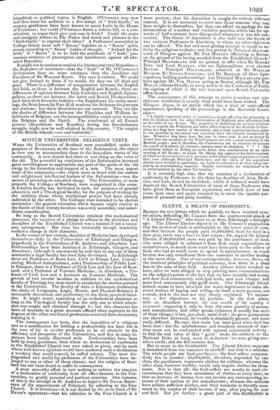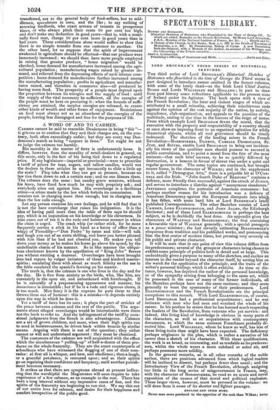PLENTY, A MEANS OF PROSPERITY.
BESIDES the two letters which we publish, we have received seve- ral others, defending Mr. COBDEN from the controversial attack of " A Liberal Elector," who wrote to us from Edinburgh a fortnight ago. The Liberal Elector objected to Mr. COBDEN s supposition that the revival of trade is attributable to the lower price of corn, and that because the people paid 60,000,000/. more for food in a dear year, trade was a loser to that extent ; for, argued the Liberal Elector, if 60,000,0001. more was paid by the purchasers of food, who were obliged to subtract it from their usual expenditure on manufactures, so much more must have been paid to the sellers of food, who had so much more to spend in manufactures : so much income was only transferred from one customer to another dealing at the same shop. One of our correspondents, however, shows, on the received principles of political economy, how there is a dead loss in the case of dear food. Another (whose letter reached us later, after we were obliged to stop printing more communications on the subject) points to the fact that we have recently had scanty and dear food concurrently with jtad trade, and now cheaper and more food concurrently with goo ff trade. Our Edinburgh friend, indeed, seems to have attached too much importance to some ab- stract notions of buying and selling—in itself a mere process, not a result, and in the case not very clearly explained. To enume- rate a few objections to his position. In the first place, with an abundant harvest, the real wealth of the country is increased : supposing it only to have the same quantity of money, and manufactures, and other goods, (whereas it usually has more of those things,) it has, ipso facto, more food ; its gross possessions are therefore increased, its wealth is absolutely greater, and more easily diffused. He says that trade has been good when food has been dear : but the unwholesome and transitory demands of war- time must not be confounded with natural commercial activity : to find the real value of that " good " trade, the addition to the National Debt, at least, must be deducted: we were giving our- selves credit, and the bill remains due.
But to recur to the 60,000,0001. The Liberal Elector supposes it transferred from one customer to anothet-: but that is a mistake. The whole people are food-purchasers; the food-sellers compara, tively few in number : 60,000,000/., therefore, expended by one class, the purchasers, represents clothes for millions; whereas the other class, however wealthy, would only require clothes for thou, sands. Nor is that all : the food-sellers are mostly in such cir- cumstances that they have abundance of clothes at every time, so that an increase of income does not involve any corresponding in- crease of their custom to the manufacturer ; whereas the millions have seldom sufficient clothes, and their wardrobe is literally mea- sured by the surplus of their income, if any, after paying for rent and food. But yet further : a great part of this 60,000,0001. is
transferred, not to the general body of food-sellers, but to mid- dlemen, speculators in corn, and the like ; to say nothing of screwing landlords, who exact arrears of tenants in prosperous times, or who always pitch their rents 10 per cent too high, and don't make any deduction in good years—that is, with a nomi- nally fixed rent, charge 10 per cent more in good years than in bad years. These considerations alone would suffice to show that there is no simple transfer from one customer to another. On the other hand, let us suppose that the spirit of improvement awakened in agriculture should be effectual—that our produce were immensely increased : we should then have more people employed in raising that greater produce, " home migration " would be checked, home demand for manufactures increased among the agri- cultural population ; manufacturing wages raised by greater de- mand, and relieved from the depressing effects of such intense com- petition ; home demand for manufactures further increased among the manufacturing population ; profits in agriculture and manufac- tures raised, and therefore in commerce also—all produced by having more food. The prosperity of a people must depend upon the proportion between its energies and the supply of food : until the supply of the vital necessary be sufficient, all the energies of the people must be bent on procuring it : when the bounds of suffi- ciency are attained, the surplus energies are released, to create other kinds of wealth and other forms of enjoyment. Restrictions on food must always act as an absorbent of the energies of the people, leaving less disengaged and free for the purposes of life.



























 Previous page
Previous page